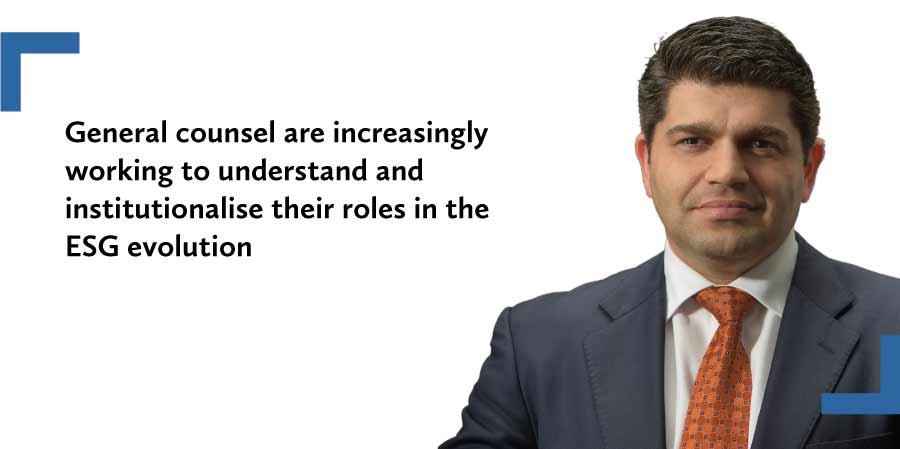Republished with permission by the China Business Law Journal

For general counsel, embracing responsible governance may not be easy, but it is the right thing to do, writes Mike Madden, global board chair of the Association of Corporate Counsel.
Investor focus on environmental, social and governance-related (ESG) issues is intensifying. According to a 2020 Trends Report by the US Forum for Sustainable and Responsible Investment, total sustainable investment assets under management in the US alone reached USD17.1 trillion at the end of 2019, a 42 percent increase from 2018. Bloomberg Intelligence forecasts that “global ESG assets are on track to exceed USD53 trillion by 2025, representing more than a third of the USD140.5 trillion in projected total assets under management”.
As a result, general counsel are increasingly working to understand and institutionalize their roles in the ESG evolution, and are quickly solidifying their position as a true partner to the business and an indispensable member of the executive team.
The ESG function itself has also evolved considerably with the focus, once primarily on environmental issues, shifting to include communication, transparency, and equity in the workplace. This shift has greatly affected how businesses approach governance and social matters, and has brought into focus and placed greater emphasis on each branch of the ESG function. These functions are becoming increasingly part of regular business functions, with greater oversight and responsibility by the legal department on the regulatory and compliance requirements.

As ESG continues to become a higher priority for most executives, many of these issues are not new to GCs and in-house legal teams as they likely have been focused on corporate governance and compliance for some time. With greater scrutiny on transparency and accountability brought on by laws, regulations, and stakeholders, an increasingly wider range of ESG-related issues have evolved requiring considerable time and attention from GCs and in-house legal teams. It is without question that this is the GCs’ rightful place because ESG is underpinned by legal requirements and significant reputational risk.
Businesses operating in or with links to developed economies have been regulated in areas such as modern slavery, anti-bribery and corruption, anti-money laundering, and health and safety and employment matters. These obligations are increasingly regulated by disclosure and reporting requirements that are aimed at driving greater transparency and accountability on ESG factors. That in turn is leading to these increased levels of activism and litigation risk as it becomes easier to scrutinize corporate behavior, resulting in more demands by stakeholders such as shareholders, institutional investors and the broader public for an even greater focus on ethical, sustainable, and responsible approaches to a variety of ESG-related issues.
GCs have played and continue to play a critical role in helping their organizations to engage with this fast-changing and demanding landscape, while meeting stakeholder expectations. In that context, in-house teams are required to not only manage the legal risks relating to their organization's ESG agenda, but also need to navigate the potential reputational risks regarding the company’s ESG commitments and performance.
Certainly, I would argue that chief legal officers (CLOs) are well-positioned to assume leadership roles in this effort with increasing access, insights and responsibilities throughout their organizations. According to ACC's 2022 Chief Legal Officers Survey, we see increasing or steady trends of GCs reporting directly to the CEO, meeting with the executive leadership team to discuss business decisions, as well as meeting directly with the board of directors.
Also, while 80 percent of respondents said compliance reports to them, they also shared that ethics (48 percent), privacy (47 percent), and risk (40 percent) do as well – all key components from an ESG perspective. In fact, ESG had the largest increase (9 percent) of all functions surveyed that have become part of the legal department in the past two years. The key point here is that for GCs to be effective with ESG and all other corporate matters, they must have a seat at the table, represented in the C-suite and in the boardroom.
The GC has a role to play in advising the board to ensure it receives relevant information at an appropriate level of detail in relation to issues that are subject to board oversight and decision-making.
There are several factors to consider. Given the ESG emerging trends and the activism and litigation threats, for many directors ESG matters are fast becoming a significant part of their oversight of the organisation. The tone from the top is critically important to building a culture of integrity. It follows that the question GCs should encourage directors to ask themselves is no longer simply “is this lawful?” but, “is this lawful and the right thing to do?”
In addition, cybersecurity is one big example of the corporate legal department’s increasing purview. The ACC Foundation’s 2020 State of Cybersecurity Report shows that 18 percent of organizations have an in-house lawyer dedicated to cybersecurity, which is up from 12 percent in 2018. In most cases, this lawyer is responsible for cybersecurity across the enterprise, and is in an executive-level position in 56 percent of organizations. And it doesn’t stop there, with the legal department’s role continuing to expand, increasingly covering areas such as business strategy, privacy, ethics, human resources and reputational risk. This unique perspective gives us unparalleled insights into how ESG impacts numerous aspects of the company.
No matter the industry, mandates are catching up, and without them disclosure risks are real. And to be certain, there is no “one-size-fits-all” approach when it comes to ESG either, nor is there a defined and globally accepted set of standards. However, there are unique opportunities for companies, even in very different industries, to embrace ESG and focus on what makes sense for each organization. GCs should embrace this opportunity, become an expert on how your organization can best maximize efforts around ESG, and in the process become an even more invaluable resource to the chief executive officer (CEO) and the board.
And just as CLO roles are extensive, so too is the scope ESG covers. Environmental and diversity-related topics have garnered a lot of attention lately, and will continue to do so. But in addition to those critical areas, ESG covers a lot of other areas for potential engagement and corporate leadership including corporate purpose, vision, mission, strategy, engagement with employees, suppliers, customers, communities, and governments.
So, where to begin? I suggest being proactive; complete an environmental scan both internally and externally to see where opportunities lie and offer ideas and answers on how to move your organization forward, even if incrementally. Identify what specific or general areas make sense for your organization. You can be vocal; look at the many companies and CEOs speaking out and taking positions on things that matter and align with their organization's specific mission and values, and those of their customers or members.

Use your public disclosure documents and your website as places to craft a consistent and continuing narrative on your ESG-related activities. And finally, keep it simple. Decide who your target stakeholders and audience are and then figure out the best ways to engage with them. Remember, if you are taking steps forward, you’re making progress.
Much activity around ESG is new and evolving, and is likely to only intensify, which can cause considerable concern and anxiety for GCs. I get that. But with proper planning, communication and outreach, ESG can offer organizations, large and small, unique opportunities to engage with key stakeholders and reach new audiences.
Mike Madden is the global board chair of ACC. ACC is the largest global legal association for in-house counsel, spanning 85 countries and with more than 43,000 members.
Disclaimer: The information in any resource in this website should not be construed as legal advice or as a legal opinion on specific facts, and should not be considered representing the views of its authors, its sponsors, and/or ACC. These resources are not intended as a definitive statement on the subject addressed. Rather, they are intended to serve as a tool providing practical guidance and references for the busy in-house practitioner and other readers.




